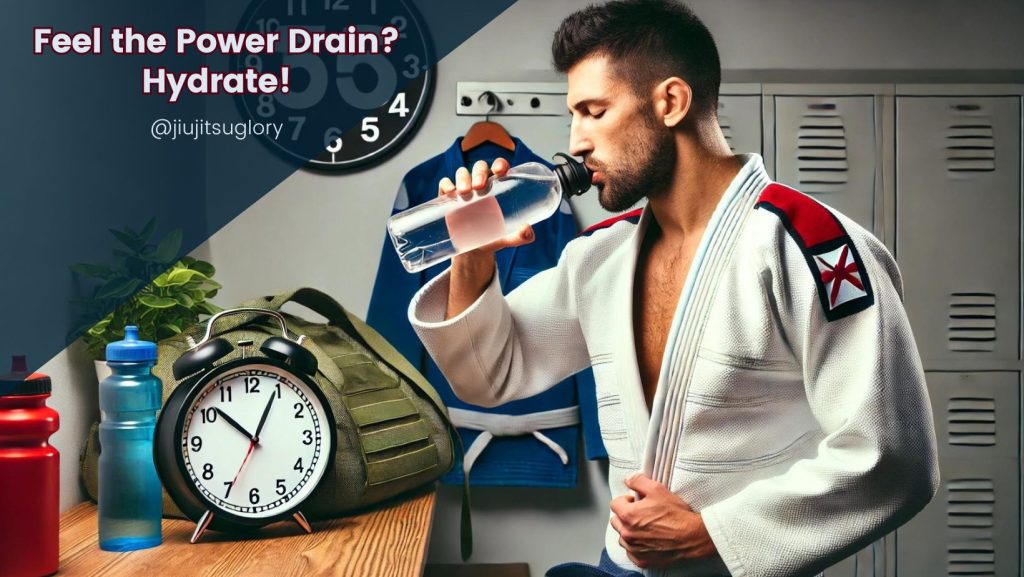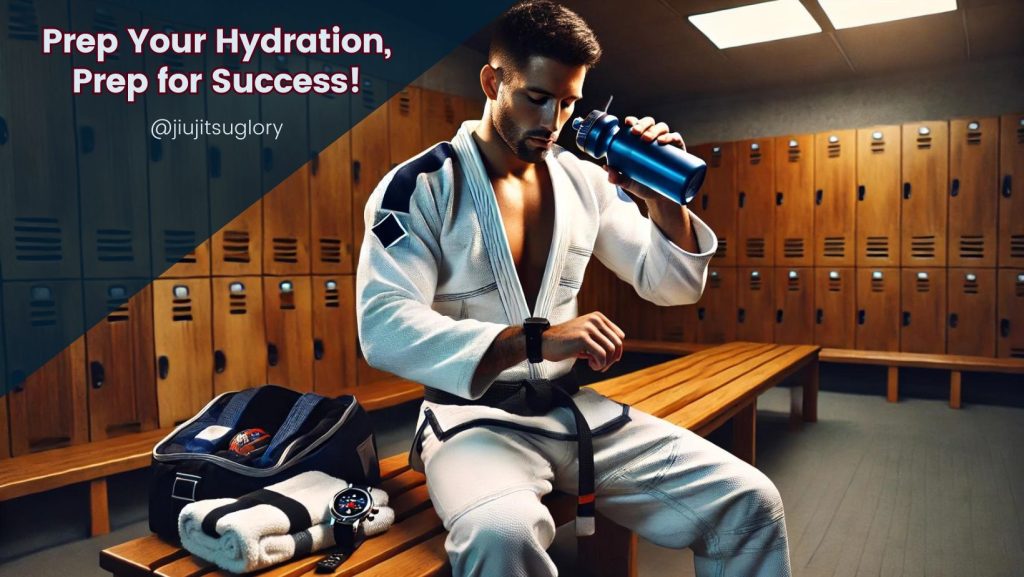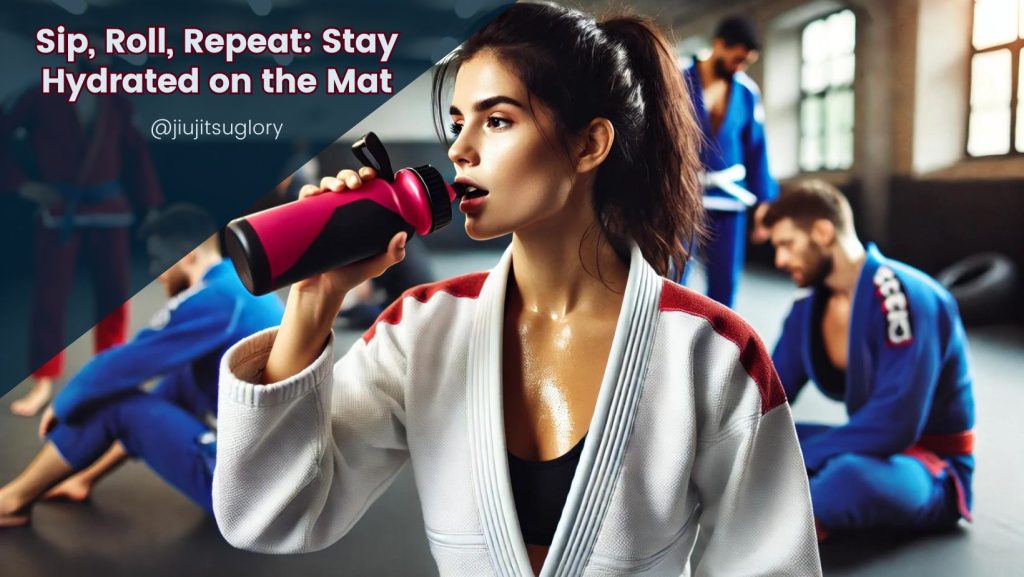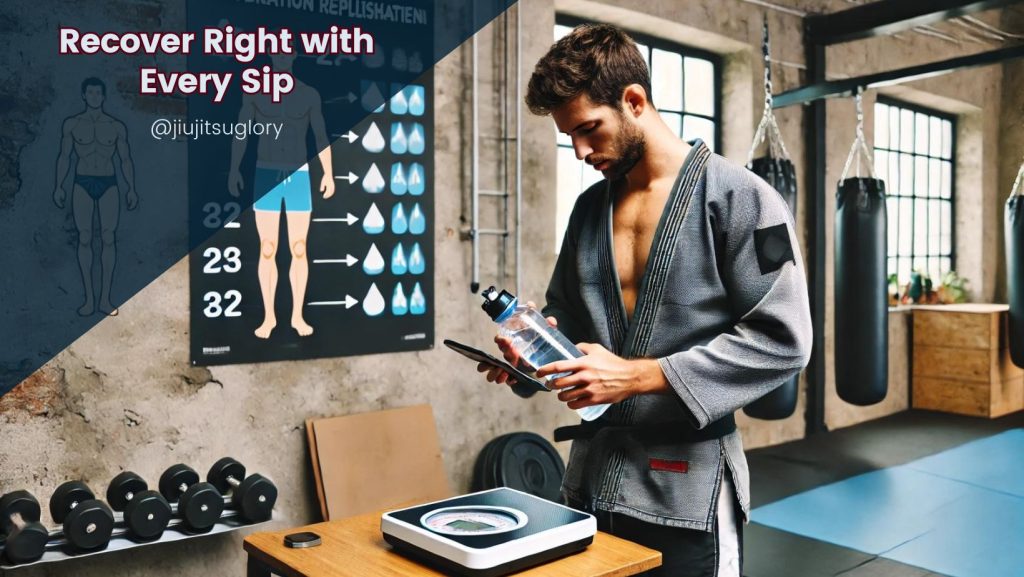
Have you ever felt your energy sap away during a tough BJJ roll, as if someone had flipped your power switch off? You might be overlooking a crucial component of your fitness: hydration.
For Brazilian Jiu-Jitsu enthusiasts, staying hydrated is critical to maintaining peak performance and swift recovery.
This guide will uncover top hydration tips to keep you at your best on the mats.
Understanding Hydration

Hydration refers to maintaining the right balance of fluids in your body. It’s essential because water performs multiple functions, such as regulating body temperature, lubricating joints, and transporting nutrients.
Staying hydrated can mean the difference between peak performance and fatigue for athletes.
Dehydration, however, can lead to decreased coordination, muscle cramps, and even heat stroke.
It’s important to recognize signs of dehydration, which include thirst, dry mouth, fatigue, and dark-colored urine.
Daily Hydration Needs for BJJ Recovery

While general guidelines suggest drinking about 2-3 liters of water daily, BJJ athletes may need more due to the intense physical activity that characterizes the sport.
According to bjjstrongonline, BJJ athletes must maintain a baseline hydration level of about one gallon of 3 to 4 liters of fluids daily. Hydration needs during training,
however, are more personalized and can be gauged with a simple protocol:
- Weigh-In: Check your weight before training.
- Weigh Out: Measure again after training.
- Calculate Fluid Loss: Subtract the post-training weight from the pre-training weight and increase it by 125%. This accounts for the sweat lost and ensures you add a bit extra for optimal recovery.
Example: If you start at 75 kg and drop to 73.5 kg, you lose 1.5 liters of fluid. Multiply this by 1.25 to determine you need about 1.875 liters of fluid for recovery over the next few hours.
Otherwise, the table below highlights the fluid needed for recovery in different situations.
| Weight Before (kg) | Weight After (kg) | Fluid Lost (L) | Fluid Needed for Recovery (L) |
|---|---|---|---|
| 75 | 73.5 | 1.5 | 1.875 |
| 80 | 78.5 | 1.5 | 1.875 |
| 85 | 83.5 | 1.5 | 1.875 |
| 90 | 88 | 2.0 | 2.5 |
| 95 | 93 | 2.0 | 2.5 |
| 100 | 98 | 2.0 | 2.5 |
Notes:
- Fluid Lost: Calculated by subtracting the weight after training from the weight before training.
- Fluid Needed for Recovery: Calculated by multiplying the fluid lost by 1.25, accounting for the fluid lost in sweat plus a little extra to ensure complete rehydration.
Hydration Before BJJ Training

Starting your training session well-hydrated sets the stage for optimal performance.
Aim to drink 500-600 ml of water about two to three hours before training. This allows your body to absorb the fluid and stabilize fluid levels before physical activity begins.
Incorporating electrolytes, such as sodium and potassium, can also be beneficial. They help retain fluids and prevent cramps, preparing your body for vigorous movements in BJJ.
Hydration During Jiu-JitsuTraining

Maintaining hydration during a BJJ session is crucial to avoid the dip in physical and cognitive performance.
Sip small amounts of water or an electrolyte-rich sports drink regularly throughout the session to replace fluids lost through sweat.
If you prefer water, consider adding a pinch of salt and a squeeze of lemon for natural electrolytes.
The key is to drink before you feel thirsty, as thirst is a late indicator of dehydration.
Post-Training Hydration

Rehydration is as essential after intense BJJ training as before and during exercise. Start replacing lost fluids immediately after training.
A good rule of thumb is to drink about 1.5 liters of fluid for every kilogram of body weight lost during exercise. This helps in recovery and prepares your body for the next training session.
Including electrolytes in your post-training hydration can help restore the balance of fluids more effectively.

Additional Hydration Tips
Monitoring the color of your urine is a practical way to assess your hydration status. Aim for a light straw color; anything darker may indicate dehydration.
Additionally, weighing yourself before and after training can help determine how much fluid you need to replenish—each pound lost equals about 473 ml of water.
Consider integrating water-rich foods like cucumbers, watermelons, and oranges into your diet to help maintain hydration.
Practical Hydration Strategies for Competitions

BJJ practitioners face back-to-back matches during competitions, making efficient hydration essential.
Plan to hydrate well before the event and maintain fluid intake between matches.
If competing in different climates, especially warmer ones, increase your pre-competition hydration to acclimate your body.
Always have water and electrolyte solutions handy to replenish fluids quickly between fights.
See also: 10 Invaluable Tips for a Faster Recovery in Brazilian Jiu-Jitsu

Conclusion
Mastering hydration is as important as mastering techniques on the mats. It is about understanding and meeting your body’s unique needs before, during, and after training.
You can improve performance, speed up recovery, and avoid dehydration by following personalized hydration strategies.
Stay alert and hydrated; you’ll see improved stamina and focus in Brazilian Jiu-Jitsu. Embrace hydration as a crucial part of your training routine for tangible benefits in every session.


